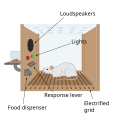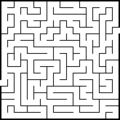Classical conditioning (also respondent conditioning and Pavlovian conditioning) is a behavioral procedure in which a biologically potent stimulus (e...
66 KB (8,779 words) - 22:17, 23 April 2025
Operant conditioning, also called instrumental conditioning, is a learning process in which voluntary behaviors are modified by association with the addition...
69 KB (9,071 words) - 05:23, 2 May 2025
Kicman P, Lisińska N (2017). "How Classical Conditioning Shapes Placebo Analgesia: Hidden versus Open Conditioning". Pain Medicine. 19 (6): 1156–1169...
14 KB (1,839 words) - 10:38, 12 January 2024
can be used to study both operant conditioning and classical conditioning. Skinner created the operant conditioning chamber as a variation of the puzzle...
16 KB (1,803 words) - 00:30, 2 May 2025
associations is the basis for learning. This learning is seen in classical and operant conditioning.[citation needed] Edward Thorndike did research in this area...
18 KB (2,446 words) - 03:20, 22 March 2025
Bedwetting alarm (section Classical conditioning)
This suggests that the conditioning treatment may follow the operant avoidance conditioning rather than the classical conditioning pattern. In addition...
12 KB (1,718 words) - 00:07, 14 July 2024
hormone, following the initial stressor. Classical conditioning Extinction (psychology) Eyeblink conditioning Fear processing in the brain Infralimbic...
31 KB (3,884 words) - 14:15, 28 January 2025
Social conditioning is the sociological process of training individuals in a society to respond in a manner generally approved by the society in general...
14 KB (1,887 words) - 08:49, 30 January 2025
In classical conditioning, second-order conditioning or higher-order conditioning is a form of learning in which the first stimulus is classically conditioned...
6 KB (784 words) - 21:22, 10 May 2025
are presented is an important factor in all forms of classical conditioning. Forward conditioning describes a presentation format in which the CS precedes...
20 KB (2,960 words) - 05:18, 7 January 2025
term conditioned emotional response (CER) can refer to a specific learned behavior or a procedure commonly used in classical or Pavlovian conditioning research...
6 KB (904 words) - 19:16, 24 February 2025
Ivan Pavlov (section Classical conditioning)
experimental neurologist and physiologist known for his discovery of classical conditioning through his experiments with dogs. Pavlov also conducted significant...
38 KB (4,155 words) - 03:03, 17 May 2025
Eyeblink conditioning, classical conditioning involving pairing of a stimulus with an eyeblink-eliciting stimulus Fear conditioning, classical conditioning involving...
2 KB (320 words) - 02:48, 16 March 2025
Latent learning (section Classical conditioning)
the other learning theories such as operant conditioning or classical conditioning. Classical conditioning is when an animal eventually subconsciously...
15 KB (2,127 words) - 05:20, 10 March 2025
previous to learning, which may or may not be zero). In classical conditioning, when a conditioned stimulus is presented alone, so that it no longer predicts...
36 KB (4,423 words) - 06:29, 12 May 2025
Phobia (section Classical conditioning)
fearful stimuli occurs through fear conditioning. Like classical conditioning, the amygdala learns to associate a conditioned stimulus with a negative or avoidant...
71 KB (8,115 words) - 12:38, 16 April 2025
Evaluative conditioning is a form of classical conditioning, as invented by Ivan Pavlov, in that it involves a change in the responses to the conditioned stimulus...
4 KB (557 words) - 02:58, 16 March 2025
differences in classical conditioning were observed 24 hours later. Inactivating the mPFC in the male rats did not prevent the enhanced conditioning that the...
68 KB (8,384 words) - 13:44, 10 April 2025
Prenatal memory (section Classical conditioning)
They are: classical conditioning, habituation and exposure learning. Classical conditioning is described as the pairing of a conditioned stimulus (CS)...
38 KB (5,026 words) - 11:01, 16 January 2025
Habitual learning is formed through conditioning, whether that is voluntary or involuntary. Classical conditioning denotes when an organism creates reflexes...
14 KB (1,732 words) - 00:29, 15 February 2025
Claustrophobia (section Classical conditioning)
many factors, including a reduction in the size of the amygdala, classical conditioning, or a genetic predisposition to fear small spaces. One study indicates...
28 KB (3,794 words) - 09:51, 11 April 2025
motor behavior the precedes the presenting of food. So classical conditioning and operant conditioning are very much related. Positive emotion stimuli will...
36 KB (4,676 words) - 17:08, 15 February 2024
mostly inherits the fundamental concepts from classical conditioning (and some from operant conditioning), which primarily focused on studying animals...
20 KB (2,561 words) - 04:25, 29 December 2023
Behaviorism (section Operant conditioning)
conditioning plays the largest role in discussions of behavioral mechanisms, respondent conditioning (also called Pavlovian or classical conditioning)...
89 KB (10,531 words) - 21:16, 24 April 2025
Learning (section Classical conditioning)
example, learning may occur as a result of habituation, or classical conditioning, operant conditioning or as a result of more complex activities such as play...
79 KB (9,970 words) - 22:02, 19 May 2025
study that mid-20th century psychologists interpret as evidence of classical conditioning in humans. The study is also claimed to be an example of stimulus...
23 KB (2,880 words) - 04:05, 10 May 2025
Dog training (section Classical conditioning)
receives attention. Classical conditioning (or Pavlovian conditioning) is a form of learning in which one stimulus, the conditioned stimulus, comes to...
92 KB (10,604 words) - 21:33, 19 May 2025
behavior-change intervention." Respondent (classical) conditioning is based on involuntary reflexes. In respondent conditioning, an unconditioned response occurs...
92 KB (10,545 words) - 04:53, 19 May 2025
("R-W") is a model of classical conditioning, in which learning is conceptualized in terms of associations between conditioned (CS) and unconditioned...
13 KB (1,805 words) - 15:03, 16 February 2025
Cupboard love (section Classical conditioning)
whoever satisfies their needs through conditioning. In this theory, any caregiver (often parents) can reinforce conditioning. Caregivers then become associated...
21 KB (2,575 words) - 12:56, 14 April 2025











